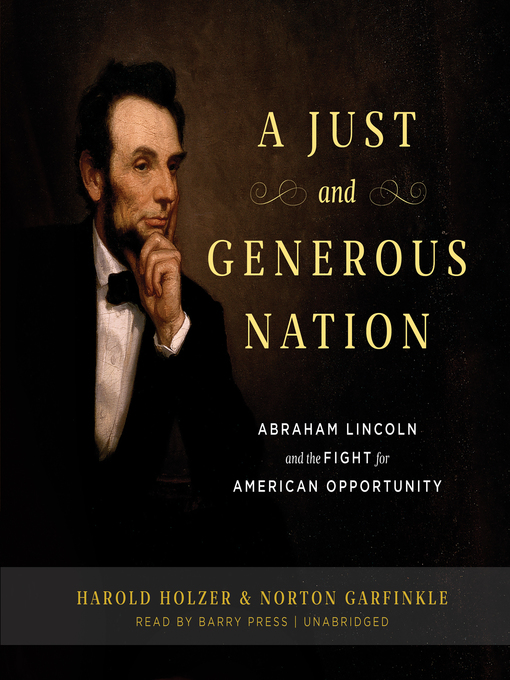A Just and Generous Nation
Abraham Lincoln and the Fight for American Opportunity
-
Creators
-
Publisher
-
Release date
November 3, 2015 -
Formats
-
OverDrive Listen audiobook
- ISBN: 9781504641982
- File size: 292881 KB
- Duration: 10:10:10
-
-
Languages
- English
-
Reviews
-
Publisher's Weekly
Starred review from August 31, 2015
Lincoln scholar Holzer (Lincoln and the Power of the Press) and economist Garfinkle justify adding another Lincoln biography to the overflowing genre by conceiving, and supporting, a radical explanation for the great question about Lincoln’s life: Why exactly was the Civil War fought? Eschewing the traditional justifications of ending slavery or preserving the Union, the authors maintain that the overriding factor behind Lincoln’s response to the secession of the Southern states was his commitment to pursuing “economic opportunity for the widest possible circle of hardworking Americans.” That surprising thesis is based on a close reading of Lincoln’s own statements, going back to his early political life. His support for infrastructure projects while he was an Illinois state legislator resulted from his view of government’s responsibility to provide, in the authors’ words, “opportunities for working people to improve their economic status.” That thinking led him to argue that every American, regardless of their race, deserved to profit from their work. The authors spend the last third of the book tracing the fate of Lincoln’s economic agenda under his successors, giving their research a more practical angle than simply analyzing the historical record. The thesis is sure to be controversial, but Holzer and Garfinkle make their point well.
-
Formats
- OverDrive Listen audiobook
Languages
- English
Loading
Why is availability limited?
×Availability can change throughout the month based on the library's budget. You can still place a hold on the title, and your hold will be automatically filled as soon as the title is available again.
The Kindle Book format for this title is not supported on:
×Read-along ebook
×The OverDrive Read format of this ebook has professional narration that plays while you read in your browser. Learn more here.

